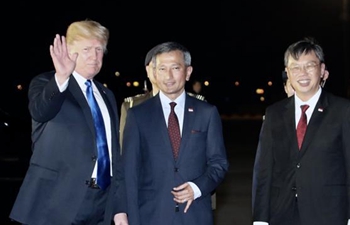WASHINGTON, June 10 (Xinhua) -- As the June 12 summit between leaders of Washington and Pyongyang impends, U.S. lawmakers and scholars conveyed optimism and hope for the historic summit while holding concern for its hard-to-predict outcome.
Victor Cha, a veteran Korea expert, said that the impending summit between U.S. President Donald Trump and the Democratic People's Republic of Korea (DPRK)'s top leader Kim Jong Un could potentially lead to a historic moment in U.S. policy on the Korean Peninsula.
Trump and Kim will meet at a luxury hotel in Singapore on Tuesday, a back-on-track meeting saved by a two-week whirlwind diplomacy after Trump called it off in late May.
James Risch, a Republican senator from Idaho, believes that the summit could be a success if the two sides can get mutual objectives and work in good faith.
"The parties are going in the right direction," said Risch, also a member of the Senate's Foreign Affairs Committee, in an interview with National Public Radio.
Before heading to Asia, U.S. Secretary of State Mike Pompeo said at a White House news conference on Thursday, "We are hopeful that we will put ourselves in a position that we can do something the previous administration didn't do."
Apart from applauding the fact that the Trump-Kim talks could finally take place, scholars remained low-key about the outcome of the meeting which has been described as "high stakes" by U.S. media.
Cha, once serving as top adviser on the DPRK for former U.S. President George W. Bush, noted that a one-shot denuclearization agreement is not likely to end a program that started decades ago.
"Having an established channel of official diplomatic dialogue, such as liaison offices, might help the denuclearization process, create familiarity among the parties, and enable productive dialogue opportunities," said Cha in his written testimony for a Senate hearing last Tuesday.
The best possible outcome from the summit would be an agreement to hold more high-level talks and summits, Kyle Ferrier, an analyst for the Washington-based non-profit Korea Economic Institute of America, told Xinhua recently.
"One of the areas where both sides have a great shared interest and seemingly found the most common ground to make future progress is a possible peace treaty," said Kyle.
"If differences over denuclearization still prove to be too sticky to make progress on just yet, a peace treaty is an obvious area to keep the momentum for diplomacy going," the scholar added.
Meanwhile, U.S. lawmakers from the Democratic Party still laid much emphasis on the "requirements" the DPRK has to meet before any deal can be made.
In a letter to Trump, seven senior Senate Democrats detailed the conditions of winning their support for any deal yielded in the Trump-Kim meeting, including dismantling all of its nuclear, chemical and biological weapons, as well as ballistic missiles and programs.
Expressing hope for a successful summit, Senate Minority Leader Chuck Schumer, a democrat, told media earlier this week that Trump "has to be willing to walk away from the table if there isn't a good deal to be had."
Richard Haass, president of the U.S. think tank Council on Foreign Relations, said in a tweet on Saturday that if the Trump administration would only consider removing sanctions after the DPRK "completely and verifiably" eliminated its weapons of mass destruction programs, that will limit the outcome of the talks.
"This 'all before anything' sequentialism would effectively eliminate US-NK (the DPRK) diplomatic prospects," Haass noted.













